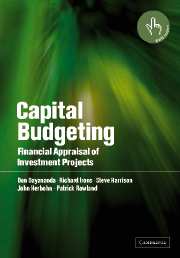Book contents
- Frontmatter
- Contents
- List of figures
- List of tables
- Preface
- 1 Capital budgeting: an overview
- 2 Project cash flows
- 3 Forecasting cash flows: quantitative techniques and routes
- 4 Forecasting cash flows: qualitative or judgemental techniques
- 5 Essential formulae in project appraisal
- 6 Project analysis under certainty
- 7 Project analysis under risk
- 8 Sensitivity and break-even analysis
- 9 Simulation concepts and methods
- 10 Case study in financial modelling and simulation of a forestry investment
- 11 Resource constraints and linear programming
- 12 More advanced linear programming concepts and methods
- 13 Financial modelling case study in forestry project evaluation
- 14 Property investment analysis
- 15 Forecasting and analysing risks in property investments
- 16 Multinational corporations and international project appraisal
- References
- Index
3 - Forecasting cash flows: quantitative techniques and routes
Published online by Cambridge University Press: 14 May 2010
- Frontmatter
- Contents
- List of figures
- List of tables
- Preface
- 1 Capital budgeting: an overview
- 2 Project cash flows
- 3 Forecasting cash flows: quantitative techniques and routes
- 4 Forecasting cash flows: qualitative or judgemental techniques
- 5 Essential formulae in project appraisal
- 6 Project analysis under certainty
- 7 Project analysis under risk
- 8 Sensitivity and break-even analysis
- 9 Simulation concepts and methods
- 10 Case study in financial modelling and simulation of a forestry investment
- 11 Resource constraints and linear programming
- 12 More advanced linear programming concepts and methods
- 13 Financial modelling case study in forestry project evaluation
- 14 Property investment analysis
- 15 Forecasting and analysing risks in property investments
- 16 Multinational corporations and international project appraisal
- References
- Index
Summary
Forecasting is important in all facets of business. A supermarket needs to forecast the demand for different types of cleaning agents, soft drinks and meat products. A car manufacturer has to forecast the demand for the different types of cars it produces. A farmer must forecast the demand for a variety of crops when deciding what to plant next spring. A government must forecast its tax revenue in order to design its budget each year. A business corporation needs to forecast the future requirement of different types of labour inputs, raw materials, machines and buildings as an integral part of its business processes. All business firms have to plan for the future. The success of a business firm is closely related to how well management is able to anticipate the future and develop suitable strategies. No business organization can function effectively without forecasts for the goods and services it provides and the inputs it purchases.
In project evaluation, the ‘cash flows’ of a proposed project refer to expected future cash flows of that project. The reference is not to past or historical data, but to future data expected from the proposed project. Perhaps the most critically important task in project appraisal is the forecasting of expected cash flows. The cash flows form the basis of project appraisal. If the cash flow estimates are not reliable, the detailed investment analyses can easily lead, regardless of the sophisticated project appraisal techniques used, to poor business decisions.
- Type
- Chapter
- Information
- Capital BudgetingFinancial Appraisal of Investment Projects, pp. 37 - 54Publisher: Cambridge University PressPrint publication year: 2002



